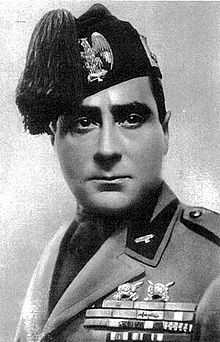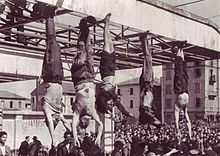Achille Starace
| Achille Starace | |
|---|---|
 | |
| Secretary of the National Fascist Party | |
| In office 12 December 1931 – 31 October 1939 | |
| President | Benito Mussolini |
| Preceded by | Giovanni Giuriati |
| Succeeded by | Ettore Muti |
| Personal details | |
| Born | 18 August 1889 Gallipoli, Kingdom of Italy |
| Died | 29 April 1945 (aged 55) Milan, Kingdom of Italy |
| Nationality | Italian |
| Political party | National Fascist Party |
Achille Starace (Italian pronunciation: [aˈkille staˈratʃe]; August 18, 1889 — April 29, 1945) was a prominent leader of Fascist Italy before and during World War II.
Early life and career
Starace was born in Gallipoli in southern Italy near Lecce. He was son of a wine and oil merchant.
Achille Starace attended the Lecce Technical Institute as a young man and earned a degree in accounting. In 1909, he joined the Italian Royal Army (Regio Esercito) and by 1912 had become a Second Lieutenant (Sottotenente) of the élite sharpshooters (Bersaglieri).
Seeing action during World War I, Starace was highly decorated for his service, winning a Silver Medal of Military Valor. After the war, he left the army and moved to Trento, where he first came into contact with the growing Fascist movement.
An ardent nationalist, Starace joined the Fascist movement in Trento in 1920 and quickly became its political secretary. In 1921, his efforts caught the attention of Benito Mussolini, who put Starace in charge of the Fascist organization in Venezia Tridentina. In October 1921, Starace became Vice-Secretary of the National Fascist Party (Partito Nazionale Fascista, or PNF). In 1922, Starace participated in the March on Rome (Marcia su Roma), leading a squadron (squadristi) of Blackshirts (Camicie Nere, or CCNN, or Squadristi) in support of Mussolini.
Prominence
Later in 1922, Starace was appointed Party Inspector of Sicily and made a member of the Executive Committee of the PNF. In 1923, after resigning as Vice-Secretary of the party, he was made commander of the National Security Volunteer Militia (Milizia Volontaria per la Sicurezza Nazionale or MVSN) in Trieste. The MVSN was an all-volunteer militia created to organize former Blackshirts.
In 1924, Starace was elected to the Italian Chamber of Deputies and made National Party Inspector. In 1926, Achille Starace once again became Vice-Secretary of the PNF, and, in 1928, he was appointed Secretary of the Milan branch of the party.
Party secretary
In 1931, his career reached its peak when he was made Party Secretary of the PNF. He was appointed to the position primarily for his unquestioning, fanatical loyalty to Mussolini. As secretary, Starace staged huge parades and marches, proposed Anti-Semitic racial segregation measures, and greatly expanded Mussolini's cult of personality.
Although Starace was successful in increasing party membership, he failed in the later years of his tenure as Secretary to reorganize the Italian Fascist Youth Organization (Opera Nazionale Balilla) along the lines of the Hitler Youth (Hitler-Jugend). He also failed to inspire a nationwide enthusiasm for Fascism on par with the popularity that the Nazi Party enjoyed in Germany. Starace served as secretary for a total of eight years. This was longer than any other Secretary had served. But, by the mid-1930s, he had gained numerous enemies in the party hierarchy.
Role in the Invasion of Ethiopia
In 1935, Starace, a Colonel, took a leave of absence as PNF Party Secretary to participate in the Italian invasion of Ethiopia and fought on the northern front. In March 1936, after the Battle of Shire, he was given command of a mixed group of Blackshirts and Bersaglieri being assembled in Asmara, Eritrea. Later that month, Starace and his truck-transportable "mechanized column" prepared to advance over rough tracks to seize Gondar, the capital of Begemder Province. Before setting out, "the Panther Man" (L'uomo pantera) gave the following speech to his men:
Soldiers, this is the most risky, most difficult and most important venture of the campaign. Don't waste a shot. We are carrying all the ammunition we are going to have on this trip. This column must be like an electric live wire. Death to the touch! Truck drivers must learn to keep to the right of the road under pain of severe penalties…
Britain is a rich country, Italy is a poor country, but the people of poor countries have hard muscles. The only way to explain the action of the English is that they thought they had only to mass a war fleet in the Mediterranean and Premier Mussolini would take off his hat and bow in submission.
Instead he reared up like a thoroughbred horse and sent his soldiers into Africa. Viva Il Duce![1]
The roadbuilding skills of Starace's men played an equally important role to their combat prowess. The following morning, April 1, Starace and the column entered Gondar in triumph and two days later reached Lake Tana, securing the border region with British Sudan. The East African Fast Column (Colonna Celere dell'Africa Orientale) had covered approximately 120 km in three days.
Return to party secretary
After Ethiopia, Starace resumed his duties as Party Secretary. He continued to be controversial. For example, he decreed that all party flags must be made from an Italian-created textile fabric called "Lanital." Based on casein, Lanital was invented in 1935 and, according to Starace, it was a "product of Italian ingenuity." In 1936, Dino Grandi, the Italian Ambassador to Great Britain, appeared in London wearing a suit said to have been made from forty-eight pints of skimmed milk.[2]
During the Munich Crisis in 1938, Starace was a vocal proponent that the French should agree to cede Tunisia to Italy.
Dismissal
In October 1939, Starace was finally dismissed as Party Secretary in favor of the popular Ettore Muti. He was made Chief of Staff of the MVSN and he held this position until being dismissed for incompetence in May 1941. He was succeeded by Enzo Galbiati.
Imprisonment and death

In 1943, following the demise of Mussolini's regime, Starace was arrested by Pietro Badoglio's Royalist government. He was arrested even though his real power under Mussolini had ended two years earlier.
After unsuccessfully attempting to regain Mussolini's favor in the German-backed Italian Social Republic of Salò, Starace was again arrested. This time he was imprisoned in a concentration camp in Verona and was arrested by his former colleagues on charges that he had weakened the party during his tenure as Party Secretary.
Starace was eventually released and moved to Milan. On 29 April 1945, during his morning jog, he was recognized and captured by anti-Fascist Italian partisans. After a summary trial, he was sentenced to death.
Starace was taken to the Piazzale Loreto and shown the body of Mussolini, which he saluted just before he was shot. His body was subsequently strung up next to Mussolini's.
Awards and decorations
- Knight of the Order of Saints Maurice and Lazarus
- Officer of the Military Order of Savoy (24 August 1936), previously a Knight (17 May 1919)
- Commander of the Order of the Crown of Italy
- Silver Medal of Military Valour
- Bronze Medal for Military Valour, 4 times
- Cross of Merit of War - Grant for Military Valor
- Cross of Merit of war
- Commemorative Medal for the Italo-Austrian War 1915–1918
- Commemorative Medal of the Unity of Italy
- Allied Victory Medal 1914-1918
- Commemorative Medal of the March on Rome
- in gold "on the occasion of his appointment as Secretary of the PNF" (7 December 1931)
- in silver "awarded to the 19 commanders of the columns of the organized teams to converge on Rome" (1923)
- Cross of seniority (20 years) in the Voluntary Militia for National Security
- Grand Cross of the Order of the German Eagle
See also
- Italian Order of Battle Second Italo-Abyssinian War
References
External links
| Wikiquote has quotations related to: Achille Starace |
- Time Magazine, Monday, April 13, 1936 Hit & Run
- Time Magazine, Monday, August 29, 1938 Wool from Cows
- Description of his death
|